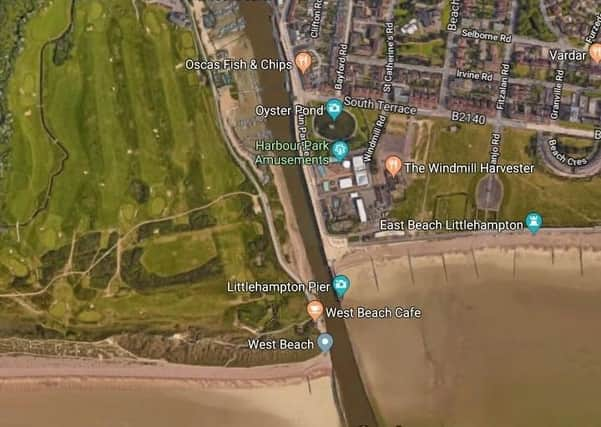Warning against dangerous ‘tombstoning’ at the River Arun in Littlehampton


A rise in the number of people both jumping into or attempting to swim across the River Arun at Littlehampton has led to a warning from authorities in the area – including Arun District Council, Littlehampton Town Council, Littlehampton Harbour Master, Littlehampton Coastguard Rescue Team, and the RNLI.
They have come together to share ‘serious concerns’ for the safety of those taking part in this dangerous activity.
Advertisement
Hide AdAdvertisement
Hide AdThe depth of water can be deceiving due to the varying tides and the shallower areas at the rivers’ edge, a spokesman said.
Hidden dangers exist beneath the water line such as rocks, debris or abandoned equipment which could cause injury, paralysis or death if landed on.
The effect of cold-water shock, even on warmer days, can make it difficult to breathe and swim, and the notoriously strong tidal current of the river Arun can quickly sweep people away from a safe and accessible way of exiting the water.
Councillor Gill Yeates, Arun District Council Cabinet Member for Community Wellbeing, said: “This is such an important, potentially lifesaving message and we are working collectively will other local agencies to ask people to efrain from jumping into the river at any time, from any location.
Advertisement
Hide AdAdvertisement
Hide Ad“We are also appealing to parents and guardians to have that important conversation with their children and teens to make them aware of the dangers involved and the possible consequences of tombstoning.”
The Littlehampton Harbour Master said: “Whilst leaping into our beautiful river may initially seem appealing in warm weather or an exciting way to blow off some steam, there are many serious hazards that are not always immediately obvious.
“Those tempted to participate in this sort of unsafe activity should also be aware that the harbour’s regulations prohibit jumping or diving into the river from the river wall as well as any jetty, pier, pontoon, bridge or boat without permission.
“The same applies to swimming in the “fairway” (the main channel where water remains at low tide) as well as around all pontoons and launching slipways.
Advertisement
Hide AdAdvertisement
Hide Ad“Swimmers are encouraged to stick to the designated bathing areas on local beaches where buoyed areas protect them from boats, and they remain under the watchful eye of RNLI beach lifeguards when they are present during the peak summer season.”
Richard Morris, Station Officer of the Littlehampton Coastguard Rescue Team, said: “We’ll always respond when someone calls 999 and asks for the Coastguard but help us to help you by not making choices which could put yourself, friends, family and frontline emergency service responders at risk.
“We want people to have fun but stay safe when out enjoying our beautiful beaches and coastlines.
“As ever, our message is, ‘Keep safe, but if you see anybody in trouble or if you get into difficulty, call 999 and ask for the Coastguard’.
Advertisement
Hide AdAdvertisement
Hide Ad“Take extra care at the coast for the remainder of this summer as we don’t want you to remember your days out and trips to the beach for all the wrong reasons.”
While the harbour does welcome organised open water swimming events and also the annual charity “Littlehampton Leap” from the Red Footbridge, these are only given permission following careful risk assessment and most often require safety boats, spotters, advance notification to boat owners or other safety measures.
The RNLI have a number of educational water safety resources available online at https://rnli.org/youth-education/education-resources/videos/safe-near-the-water.
Tombstoning means gambling with your own safety and can cost lives.
In the event of a coastal emergency, call 999 and ask for the Coastguard.